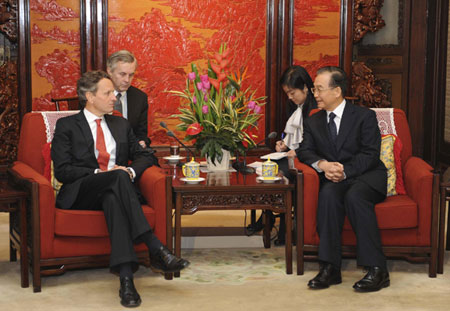Wen seeks cooperation amid trade tension
 0 Comment(s)
0 Comment(s) Print
Print E-mail
Xinhua, January 12, 2012
E-mail
Xinhua, January 12, 2012
China and the United States should enhance economic and trade cooperation rather than politicize economic issues, leading government officials said on Wednesday.
|
|
|
Chinese Premier Wen Jiabao (right) meets visiting US Treasury Secretary Timothy Geithner in Beijing on Wednesday. [Photo/Xinhua] |
|
Don't miss |
"We should take care of the core interests and concerns of each other, and resolve friction appropriately," Wen said.
"Both countries should take concrete measures and promote cooperation in trade, investment, infrastructure and high-tech, in a wider, closer, more balanced way."
Wen's remarks came against a backdrop of economic and trade friction between China and the US.
The Wall Street Journal on Tuesday reported that US President Barack Obama plans to form a government taskforce to monitor China's compliance with US trade rules.
Confirmation is expected later this month, it said.
Late last month wind turbine manufacturers in the US filed a complaint with the US Department of Commerce and the International Trade Commission claiming that China and Vietnam were dumping products at below-cost prices and receiving government subsidies.
It follows a probe into solar panel manufacturers in China by a group of US companies last October.
"This year is of decisive importance for both China and the US maintaining stable development for China-US relations is very important," Vice-President Xi Jinping said during his meeting with Geithner on Wednesday.
"China is willing to expand economic and financial cooperation with the US, resolving friction through consultation rather than politicizing economic issues. This will help maintain sustainability of the two economies and allow the world economy to recover sooner."
Geithner said the US agreed with China on developing "closer" economic and trade cooperation, promoting economic growth for the two economies and maintaining global financial stability.
But experts doubt whether the US would actually transfer words into action. "This is a very tough year for the global economy. As the world's leading economies, China and the US should be cautious and responsible," said Zhang Yansheng, professor at the Institute for International Economic Research of the National Development and Reform Commission.
November will see a US presidential election and before that there will be polls in Greece and France.
"Unfortunately, what the US has done in the past few months is not reasonable, ranging from the solar panel probe to currency pressures and the Trans-Pacific Partnership Agreement," Zhang said. The agreement is a trade pact being negotiated by the US with some countries in the region.
The US Treasury Department said in its twice-yearly report last month on global currencies that the yuan is substantially undervalued and the US will "press for policy changes that yield greater exchange-rate flexibility".
The US has been pressurizing the government to appreciate the yuan. In actual fact, the yuan has appreciated by about 8 percent since China allowed greater fluctuation in June 2010.







Go to Forum >>0 Comment(s)